Forum Home > GMAT > Quantitative > Problem Solving (PS)
Events & Promotions
| Last visit was: 26 Jul 2024, 20:06 |
It is currently 26 Jul 2024, 20:06 |

Customized
for You
Track
Your Progress
Practice
Pays
08:30 AM EDT
-08:30 AM EDT
08:30 AM PDT
-09:30 AM PDT
09:55 AM PDT
-11:00 AM PDT
08:00 PM PDT
-09:00 PM PDT
05:55 AM PDT
-12:30 PM PDT
07:00 PM IST
-08:00 PM IST
09:00 PM IST
-10:00 PM IST
| FROM Stacy Blackman Consulting Blog: The MBA School Selection Process |
|
[img]https://www.stacyblackman.com/wp-content/uploads/hand-person-girl-woman-photography-thinking-831770-pxhere.com_-734x491.jpg[/img] The school selection process is one of the most important decisions you’ll make when considering an MBA degree. Whether you aim for Round 2 (or 3) this season or are laying the foundation for a future application cycle, give ample consideration regarding which programs will dominate your waking thoughts over the coming months. The MBA application process takes up a huge amount of time and effort. Most candidates feel overwhelmed with applying to more than the average of four or five schools. Therefore, it’s crucial to think strategically about school selection and develop a competitive mix of MBA programs to target. Dream or “Reach” Business Schools The majority of candidates who apply to the leading business schools are bright, personable overachievers. They would be an asset to any program. However, each year we see excellent candidates prematurely take themselves out of the running for some of the top schools. [img]https://www.stacyblackman.com/wp-content/uploads/HBS-Harvard-Business-School-Baker_library-cropped-734x430.jpg[/img] Certain programs, such as [url=https://www.stacyblackman.com/mba-application-advice/stanford-graduate-school-of-business/]Stanford GSB[/url] and [url=https://www.stacyblackman.com/mba-application-advice/upenn-wharton/]Wharton[/url], have single-digit acceptance rates. Literally, thousands of highly qualified applicants get turned down each year. But if you don’t even give yourself a chance at admission, you may always wonder, “What if…” Is there anything worse? B-school is an ambitious dream. So, shoot for the stars, or you might regret not trying. While the process is extremely competitive, you shouldn’t count yourself out before the game even begins. That’s why we recommend people ask themselves the following questions. Is getting an MBA degree your top goal? Or, is getting an MBA from a specific school what really matters most? If you’d truly feel at peace with never getting an MBA if you didn’t get into School X, then you can move forward by focusing all of your efforts solely on your dream school or schools. A word of advice, though. If your test scores are much lower than the average at your dream school, [url=https://blogs.haas.berkeley.edu/the-berkeley-mba/should-i-retake-the-gmat]give the GMAT or GRE another shot[/url]. Also, start thinking about explaining your academic weaknesses and highlighting the unique strengths you would bring to the classroom setting. In any case, come decision time, it’s important to remain realistic. [img]https://www.stacyblackman.com/wp-content/uploads/writing-pencil-creative-light-technology-thinking-714869-pxhere.com_-734x491.jpg[/img] Target Schools An acceptance to Harvard Business School or Wharton would thrill almost any applicant. But you’re going to have to balance what school you want to attend with where you can actually get in. Start with the hard data points. As a general guideline, take a look at MBA programs you like where your profile falls within the top 10 percent of admitted students. Compare your undergraduate GPA, GMAT/GRE score, years of work experience, and industry with accepted applicants reported by the school on their class profile page. If your industry is underrepresented, consider that an advantage for your application. [img]https://www.stacyblackman.com/wp-content/uploads/GMAT-study-489x734.jpg[/img] Research the schools, make sure you know what’s important to you, and figure out which ones fit well for you. Remember the Golden Rule of MBA admissions—only apply to schools you would be thrilled to attend. If you work in an industry that typically makes up a bigger portion of the applicant pool, such as investment banking or consulting, make sure within your application that you think beyond your obvious achievements and differentiate yourself through your essays and interviews by picking memorable and unique stories and experiences. Safety Schools Safety schools don’t mean bad or less desirable schools—they’re simply a more obvious fit with your numbers and profile. A good way to determine whether your list should include safety schools is by asking yourself how important it is for you to go to business school next year. Maybe you have a compelling reason you need to exit your job and make a move to grad school ASAP. If so, including safety schools among your targets is a smart strategy. If the need is immediate, then definitely include a range of schools of varying degrees of competitiveness. The application pool fluctuates each year and all you need is one admit. So, spread some risk around! It’s important to stay pragmatic and align your expectations with the MBA programs that match your particular profile. This is doubly true if your GMAT score isn’t through the roof or your career trajectory has stalled out. [img]https://www.stacyblackman.com/wp-content/uploads/board-3683740_1920-734x489.jpg[/img] Remember, though, you’re still not guaranteed an offer of admission. When your school selection includes “safety” options, that merely means your chances are far greater than at a program with an acceptance rate of 15 percent or lower. In the end, we can’t overemphasize how important it is to really be yourself in your application. That’s the best way to find the school that is right for you. Contrary to popular belief, it’s not uncommon to be admitted into a more highly-ranked program and denied by a seemingly less competitive one. That’s because the MBA admissions process is not only about numbers – it’s about numbers and experiences and personalities and fit. The post [url=https://www.stacyblackman.com/school-selection-mba-program/]The MBA School Selection Process[/url] appeared first on [url=https://www.stacyblackman.com]Stacy Blackman Consulting - MBA Admissions Consulting[/url]. [img]https://feeds.feedburner.com/~r/StacyBlackman/~4/uTo9t3jPUng[/img] |
| FROM Stacy Blackman Consulting Blog: B-Schooled Podcast Episode #81: Spotlight on Tuck School |
 Calling all Tuck School of Business hopefuls! A Tuck MBA who previously worked with Tuck admissions joins B-Schooled this week in order to share insight about the program; the benefits of Dartmouth’s New Haven, Connecticut, campus location; and what Tuck applicants can do to set themselves apart. You can find episode #81 below, or on any of the podcast apps listed afterward. B-Schooled is available on most major podcast apps, including: Apple Podcasts Spotify Stitcher TuneIn Please be sure to subscribe to B-Schooled so that you don’t miss a thing. Also, if there’s something you’d like for us to cover in a future episode, please email podcast@stacyblackman.com. We’d love to hear from you! The post B-Schooled Podcast Episode #81: Spotlight on Tuck School appeared first on Stacy Blackman Consulting - MBA Admissions Consulting. |
| FROM Stacy Blackman Consulting Blog: 4 Research Tips for Veteran MBA Applicants |
 Graduate management education provides many benefits for veteran MBA applicants. Besides the skills-building and networking opportunities, it can be an incredible launchpad for a civilian career. Yet some veterans don’t immediately see the correlation between their military skills and experiences, and those needed to lead a Fortune 500 company. Business schools admire the leadership skills, grit, and discipline veteran MBA applicants typically possess. A Washington Post editorial by former Harvard Business School Dean Nitin Nohria once asserted that MBA programs should target more veterans. “Business school can be a pathway for integrating our service members back into civilian life and for finding new ways to engage their intellect, integrity, and leadership at home.” Are you planning to transition from active military service to business school? Then begin your research by finding out how each of the programs measures up in the following areas. 1. Explore culture and fit Every applicant should consider whether the business schools that interest them are good fits as far as class size, teaching method, location, and general culture are concerned. However, a good fit is even more critical for veteran MBA applicants. Their background is quite different from most candidates, and going from active service to a classroom can be challenging. Having strong outlets of support from the school makes a world of difference. Begin by finding out how many military veteran students are in the MBA program. Veterans at top-tier business schools typically make up about five percent of each incoming class. Too few fellow servicemen and women may leave students wishing for more relatable peers. Next, find out what kinds of special programs for veterans exist. Does the business school have student clubs or organizations created specifically for veterans? Also, learn whether it offers personalized academic and career support to help veterans translate their military skills into civilian life. Reach out to current students for their honest feedback about daily life in the program. Listen for details beyond what you see on the school website or hear from admissions officers.  2. Consider recruiting efforts and admissions guidance Another sign of a military-friendly school is whether it hosts MBA admissions events or offers targeted application advice for veterans. Examples include the Veteran’s Visit Day event at MIT Sloan School of Management. Also, check out the admissions FAQs provided by the Tuck Veterans Club at Tuck School of Business. Or, take advantage of the application and mentorship provided by Wharton’s Veterans Club at the University of Pennsylvania’s Wharton School. If the school doesn’t host an admissions event specifically for military applicants, your job is a bit tougher. However, you can still determine how eager the program is to recruit veterans by looking at whether it provides support services starting during the application phase—not only once you get in. Finally, find out if the school offers deferment flexibility to candidates whose needs may change at the last minute if still on active duty. 3. Look into financial aid The high cost of business school often deters veteran applicants. Many already have families of their own, and the concern over lost wages while studying cannot be overstated. However, many financial incentives exist specifically for this group. Your actual out-of-pocket expense goes down dramatically once you factor in Veterans Affairs benefits, dedicated veterans scholarships, waived application fees, and the Yellow Ribbon Program.  Under this program, the federal government matches, dollar for dollar, any financial aid that participating schools commit, essentially providing eligible student veterans with free or reduced-cost tuition. It is designed to make out-of-state public colleges, private institutions, and graduate programs more affordable for veterans. Schools offer varying levels of support under the Yellow Ribbon Program. For example, the Chicago Booth School of Business will offer up to $30,000 per year in Yellow Ribbon scholarship support, and the VA will provide up to $30,000 in additional funding. Meanwhile, Stanford GSB will match up to full tuition and mandatory fees (minus Stanford medical insurance) for MBA students who are Yellow Ribbon eligible and opt to receive these benefits. Visit the U.S. Department of Veterans Affairs website to learn whether the business school limits the number of recipients eligible annually—some are unlimited—and to see the exact dollar amount of the maximum school contribution per student, per year. 4. Consider these resources for veteran MBA applicants 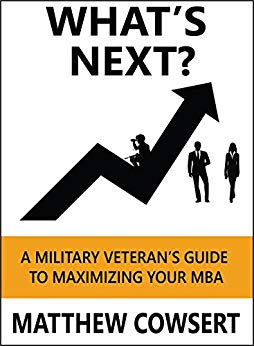 Veteran applicants need advice targeted toward their specific needs and strengths. In 2018, Matthew Cowsert, a U.S. Army veteran and MBA graduate from NYU Stern School of Business, published a book called What’s Next? A Military Veteran’s Guide to Maximizing Your MBA. Cowsert believes this book will help veterans differentiate themselves from other MBA applicants to gain acceptance to their target program. Also, check out last year’s four-part series on Transitioning to a Top-Tier MBA from the Military Money Matters site. Written by a Wharton admit who received admissions offers from six out of seven top MBA programs, it offers tons of useful information for veterans applying to b-school. Applicants from the military should know that business school admissions teams prize their experience. So, if that’s your background, make sure your applications highlight those powerful and unique qualities. The post 4 Research Tips for Veteran MBA Applicants appeared first on Stacy Blackman Consulting - MBA Admissions Consulting. |
| FROM Stacy Blackman Consulting Blog: Should You Specialize Your MBA Degree? |
 Unlike a master’s degree in finance or accounting or another specialty, an MBA is, by definition, a generalist program. It exposes students to many different disciplines—both complex subjects like finance and soft like organizational behavior. If you’re contemplating business school, think about whether you’d prefer a general management approach or one that offers majors or concentrations. Whether you choose to be a generalist at business school or to specialize your MBA degree depends heavily on your career’s end goals.  Advantages of a Generalist MBA Degree Business schools seek students who will not only get hired after graduation but eventually run the firm. Most applicants see business school as a way to grow as a leader and advance their careers. The degree imparts a strong foundation of general business knowledge. Here, students gain a complete understanding of how various departments operate. MBA students typically come to b-school with a clear career goal in mind after graduation. Yet, business school is an excellent time to explore a variety of subjects that may ultimately redirect your path. Today’s professionals want long-term flexibility in the global marketplace. To that end, career-switchers need courses that prepare them for the management responsibilities they will encounter in whichever sector they end up. A potential drawback to a general MBA is that you may not acquire the depth of knowledge required for a particular position. However, the broad range of career opportunities that comes from earning an MBA at a top program is invaluable.  Advantages if You Specialize Your MBA Degree MBA specialization is a good move for individuals who know precisely what they want to do with their careers. Likewise, it’s excellent for those who want to build a more substantial skill base in that niche area. Suppose you already know that you’re interested in an area like digital marketing, real estate, business analytics, social innovation, health care, and so forth. In that case, earning an MBA with a concentration can make you even more marketable. Recruiters like to see a strong focus on a particular field or functional area. We’re in a highly competitive job market. Having that specialization on your resume, plus a supporting internship or extracurricular activities, will help you stand out from the crowd. Students who specialize can also grow their niche network during the MBA program. That way, they’re ready to hit the ground running on day one.  Drawbacks of a Specialized MBA Degree While specializing in a specific area of business is fine, know that it can be limiting. One could even argue that you should earn a degree in that specialty instead. Depending on the career path you have chosen after graduation, by specializing, you could inadvertently pigeonhole yourself and narrow your job prospects, especially if you’re a career-changer. The classroom experience may differ notably for specialists. A traditional MBA experience includes classes full of people with diverse and enriching perspectives. Participants in the same specialization will likely have similar backgrounds and professional experiences from which to call on. Ultimately, when you’re running a company, chances are you won’t be pulling together the financial models or balancing the books. Understanding those aspects is undoubtedly essential. But you don’t need to be a master—ideally, you will hire others to do the deep dive. Whether you choose to pursue a general program or specialize your MBA degree, pay close attention to all of your classes – even the areas you would plan to outsource when you have the budget. The post Should You Specialize Your MBA Degree? appeared first on Stacy Blackman Consulting - MBA Admissions Consulting. |
| FROM Stacy Blackman Consulting Blog: What Does a Winning MBA Application Strategy Look Like Today? |
 Many of you have probably heard about skyrocketing applications to US business schools fueled by the pandemic. Despite today’s hot job market and competitive acceptance rates, now is still an excellent time to pursue an MBA degree. The competencies that business schools seek have not changed significantly in the past few years. They continue to prioritize getting to know the individual applicant’s authentic life story and character. Here’s what applicants should keep in mind if they hope to come up with a winning MBA application strategy and a spot at their school of choice. More focus on soft skills Soft skills are an essential set of personal attributes that enhance interactions, job performance, and career prospects. They are also a cornerstone of a winning MBA application strategy. The days when the ‘hard’ skills of analytical and strategic thinking dominated are over. Now, it’s oral and written communication, presentation, adaptability, and the ability to negotiate that companies want the schools to teach. 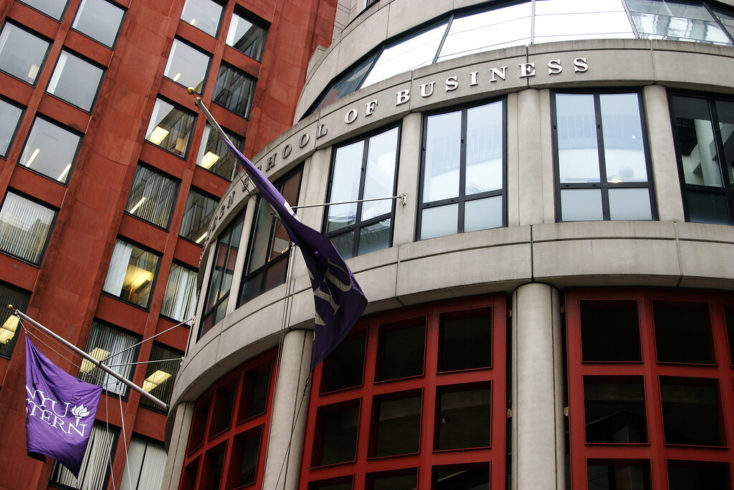 NYU Stern School of Business continues to ask for two EQ (emotional intelligence) endorsements with your application. They must come from someone who knows you personally and/or professionally and can act as a persuasive advocate of your EQ strengths. As NYU Stern Executive Director of MBA Admissions Rabia Ahmed explained to Find MBA, “EQ is attractive to MBA admissions teams and corporate recruiters alike. ‘Our alumni and corporate partners are constantly telling us that future leaders are those who can foster engaging and meaningful dialogue.” Along the same lines, the Yale School of Management includes a behavioral assessment to the MBA application to better identify high-potential candidates.  “We wanted more confidence to assess applicants who don’t perform as well on traditional measures while also looking at those who perform very well on the tests and wind up underperforming in school,” noted Laurel Grodman, the school’s Managing Director of Admissions, when the school added this component. Ever-evolving technology and greater efficiency Applicants to the full-time MBA programs at NYU Stern have several options to fulfill the standardized test requirement. For example, applicants can take GMAC’s Executive Assessment (EA) as an alternative to the GMAT or GRE. The Graduate Management Admissions Council designed the EA to evaluate business school readiness in the context of career experience. Additionally, NYU accepts the MCAT, LSAT, and DAT for admission to the MBA program.  Meanwhile, digital elements such as videos allow the admissions committee to see an applicant’s presentation and interpersonal skills. This helps them determine if you are confident and if you have any communication faults. Programs want candidates to be authentic. They also want to evaluate an applicant’s creativity and ability to think on their feet. From an admissions standpoint, videos allow the adcom to make better decisions about which candidates match the program best. It’s also a way for them to see how candidates can handle an uncomfortable or awkward situation. They want to know how a candidate operates outside of their comfort zone. Also, it helps them judge whether the “real you” matches the impression you’ve built through your other materials. With these updates in MBA admissions, schools continue to raise the bar on the essential requirements of a winning MBA application strategy. Shifting demographic trends As we previously shared with Find MBA, far more people from the technology industry are applying. Meanwhile, fewer overseas students are applying to US MBAs overall. Applicants from companies including Google, Amazon, Uber, and LinkedIn are applying in high numbers. Candidates from startup tech companies are also a more prominent presence in the applicant pool. This means that tech applicants may find the process more competitive this season. At the same time, strong overseas candidates should see easier admit odds. Remember: Focus on what you can share with your classmates that would be valuable to them—unique experience or knowledge from which others can learn and benefit. Although negotiating your acceptance into a top MBA program seems daunting, by showcasing your individuality, you can do so with success. The post What Does a Winning MBA Application Strategy Look Like Today? appeared first on Stacy Blackman Consulting - MBA Admissions Consulting. |
| FROM Stacy Blackman Consulting Blog: B-Schooled Podcast Episode #82: Interview with UT McCombs Adcom MD, Rodrigo Malta |
 If you’re interested in the University of Texas Austin McCombs School of Business, this is a can’t-miss episode! Erika interviews Rodrigo Malta, Managing Director, MBA Recruiting and Admissions at McCombs, who gives extremely insightful advice and information for aspiring MBAs. Rodrigo himself went to McCombs for his MBA, so he has a truly unique and holistic view of the program, and shares with listeners several exciting details about McCombs’ curriculum and community. You can listen to episode #82 here, or on any of the podcast apps listed below. B-Schooled is available on most major podcast apps, including: Apple Podcasts Spotify Stitcher TuneIn Please be sure to subscribe to B-Schooled so that you don’t miss a thing. Also, if there’s something you’d like for us to cover in a future episode, please email podcast@stacyblackman.com. We’d love to hear from you! The post B-Schooled Podcast Episode #82: Interview with UT McCombs Adcom MD, Rodrigo Malta appeared first on Stacy Blackman Consulting - MBA Admissions Consulting. |
| FROM Stacy Blackman Consulting Blog: How Not to Tank Your MBA Admissions Interview at HBS |
 See here for NEW 2021 HBS interview advice, including format, evaluation criteria, and sample questions. Are you gearing up for an MBA admissions interview at Harvard Business School? Lucky you, as HBS interviews just 25% of applicants each season. Make sure to avoid the following faux pas during your MBA admissions interview at this prestigious business school. Don’t even think about winging your MBA admissions interview. Harvard Business School interviewers love to throw off applicants with rapid-fire questions to test how well you know your resume and essays. If you don’t practice for this interview, you will hurt your chances of admission. Think of a few compelling anecdotes that you can adapt to fit the most common HBS interview questions. The stories you share about your past experiences — both successes and failures — will give the interviewer some insight into your self-awareness and maturity. Make sure to practice in front of a friend, and consider recording yourself as you rehearse. That way, you can assess your body language and tone and make adjustments as needed.  Don’t try to be the “ideal” MBA candidate. While it’s tempting to want to present yourself as the picture-perfect applicant, your interviewer is trying to understand what exactly you, and nobody else but you, can bring to the program. Speak candidly about your passions, interests, and professional goals. Your story should reveal how you confront life choices, the values and principles that help you negotiate complex situations, your beliefs, and your worldview. That way, you’ll come across as a fascinating person who has a lot to share with future classmates. In short, a great addition to the HBS MBA program. 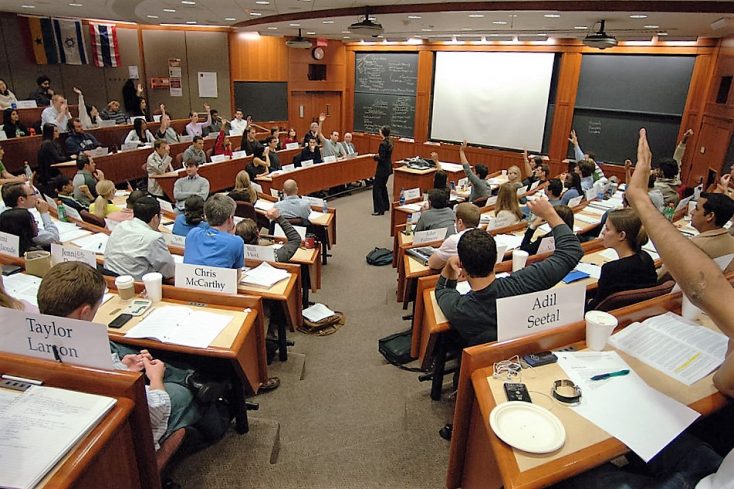 Don’t bore your interviewer. Another thing to keep in mind: Your interviewer may interview dozens of candidates. That means a lot of eager future-moguls talking about the same thing: themselves. So whenever possible, make the interview a conversation, not a monologue. By including the interviewer in the discussion, you’ll keep them interested and engaged in the most important topic of all: YOU. Don’t forget to ask questions, too. Come armed with a brief list of questions that highlight your knowledge of and interest in the school. If interviewing with an alum, it’s easy to engage in a comfortable conversation about their experience at the school. Not only will you learn more about HBS, but by asking thoughtful questions, your interviewer will get another opportunity to see your insightful way of thinking. Harvard Business School admits roughly half of all applicants they interview. Ultimately, your goal is to answer all questions in a clear, logical way. Also, maintain an open, friendly, and professional demeanor. And don’t forget to dress appropriately! Finally, show that you have a curious attitude about the school and all it offers students. If you can master these tips, you stand a good chance of coming out of the interview with flying colors. *** Contact one of our SBC Principals to request availability for HBS interview preparation by emailing hbs@stacyblackman.com asap. As a reminder, HBS interview prep support at SBC is available only after interview invites have gone out. Here’s the overview of SBC’s interview prep services. The post How Not to Tank Your MBA Admissions Interview at HBS appeared first on Stacy Blackman Consulting - MBA Admissions Consulting. |
| FROM Stacy Blackman Consulting Blog: Recommendation Letter Sample: Good or Bad? |
As MBA deadlines approach, applicants seek to support their recommenders with advice on how to optimize their letters of recommendation (LORs). Letters of recommendation, LORs, should be a validation of the professional strengths that the candidate is presenting and an indication of the potential of the candidate to become a future leader. Our clients often ask us for examples of anonymized recommendation materials for their recommenders who are less familiar with the process. Q- Is it ideal to show your recommenders sample materials? A- Not really. We have had clients ask for sample recs, and we usually try to steer them away from samples because it could confine the recommender to what someone else said about a totally different person. Erika on our SBC team shared, “We ask our clients to have faith that they picked the right recommenders who will really be their cheerleaders and who think highly of them. Just be sure to tell them to use anecdotes and example stories to prove their points — not solely a bunch of adjectives.” Q- What are examples of feedback I could give to my recommenders about their materials? A- At SBC, our consultants won’t tell the recommenders what to write. We can and do review recommender drafts for high-level or directional feedback. It’s essential that the voice and authenticity of the recommender is preserved. Here are consistent themes that we often find in our review of recommender letters:
A- It would be unethical for anyone other than the stated author to write the recommendation letters. Dawn on our team recently shared with our group, “Admissions officers are very good at detecting different writing styles. If they think the letters are over-coached or has too many different edits (which bring in different styles) then that is a red flag. The admissions officers want the recommenders to write it.” Request a free candidacy analysis if you would like feedback on your MBA plan. Q- Should I get a recommendation letter from a relative, such as through our family business? A- Most schools specifically advise against using a family member. Applicants who are in family-run businesses can get creative about finding a recommender who represents the company but is not under the thumb of a relative/ parent. A client, supplier, or other professional connected with the family business who would have the context and close working relationship could be ideal. If not, we recommend to our clients to look for recommenders at other past employers, if possible. Q-My boss was just let go this week. His rec is ready to go but hasn’t been submitted yet. What do I do? A- You have three options, and we favor the first one:
Here is our last record of the HBS recommendation form: HBS asks recommenders to rate the applicant’s traits and skills using the following scale: No Information, Area of Concern, Opportunity for Development, Solid/Meets Expectations, Relative Strength/Exceeds Expectations. Traits and Skills:
Finally, HBS poses two questions to be answered in a separate document and uploaded to the online recommendation: Please respond to both questions below in a single document. 1. How do the applicant’s performance, potential, background, or personal qualities compare to those of other well-qualified individuals in similar roles? Please provide specific examples. (Recommended: 300 words) 2. Please describe the most important piece of constructive feedback you have given the applicant. Please detail the circumstances and the applicant’s response. (Recommended: 250 words) Q- Can you share a sample recommendation letter? A- Sure: What is your relationship to the candidate and how long have you known him or her? How would you compare the candidate to others with similar responsibilities within the organization? Chris has been with Video Laboratory for over three years today. He first worked for me six years ago as an intern after his sophomore year in college. As a small organization dedicated to producing original video content for emerging distribution platforms, Chris’s interest in all aspects of video as well as technology immediately proved to be an asset, and I was pleased when he returned for the following summer. His work over those two seasons was so impressive that I personally recruited him to join us when he graduated, and since then Chris has been with Video Laboratory, formally as Development Director and more informally as my right-hand man. As a key member of a small but rapidly growing company, Chris’ energy, smarts and organization have been indispensable to me. As far back as his second internship with us, before he was even a full-time employee, I already trusted Chris to run projects effectively. As soon as he came on board full time, I put him in charge of one of our new initiatives for the year, a program aimed at identifying young minority filmmaking talent interested in creating Internet content. I had set a goal to find two to four new talents interested in working with us that summer. Instead, Chris developed half a dozen new artists and additionally devised a revenue system that made the program self-sustaining, allowing us increase the artists’ budget and pay while already showing an overall profit for the initiative. Since then, Chris’s role has been to identify new opportunities for Video Laboratory, both financial and artistic, and he has full autonomy to create teams and initiate brand-new projects that serve this goal. While several other director-level employees joined me around the same time as Chris, he has outperformed them both in fiscal and leadership aspects, and is effectively second-in-charge in my organization. Comment on the candidate’s career progression to date. How would you describe his or her potential for professional growth and development? Since the day I met Chris as a young undergraduate, his career track has been on a steady upward track. I have seen him grow from a young man who was occasionally nervous about making a phone call to a vendor into a level-headed leader, tough negotiator and creative brainstormer. He has gone from a summer intern to second-in-charge of a forty person organization, and he has the respect and loyalty of everyone in the company. I imagine that with a business degree under his belt, Chris will be able to become a leader within a much larger organization, or found a successful business himself. Comment on the candidate’s aptitude for strategic thinking, leadership, and/or management. Even in a creative industry, Chris stands out for his ability to discover and create new opportunities. I have learned over the years to run my own ideas I would have once thought impractical or half-baked past Chris first, as he will frequently help me evolve these ideas into something more practical. When that doesn’t suffice, Chris will often keep an idea in the back of his mind, sometimes for weeks or months at a time, and often will come back with a new idea fully ready to execute. As an example, we had talked on and off about how to get more young people on college campuses lacking film programs a way to get involved in creating their own film. Chris and I had a conversation one day, and I had shelved the idea until months later. Chris had done research, made phone calls and contacted student groups for a pilot program on four campuses in our state, and had a verbal agreement from a popular video website to sponsor an equipment budget for the students. It was Chris’ determination and initiative that created “Campus Stars” program, which has since expanded several times over. Along those lines, Chris’s leadership skills are something I now hardly think about, as he has developed into a natural leader over the last few years. I never questioned putting our new full-time employee running the “Campus Stars” directly under his charge, and the results have been great. I have no doubt Chris will emerge as a well-liked and respected leader wherever he goes. Describe how the candidate deals with challenges. It’s rare to see Chris with anything but a smile on his face, and he is an unfailingly supportive and positive employee and coworker. This quality is rare enough, but Chris carries this same attitude in the face of tough circumstances and other’s doubts. I have seen Chris take time out of a packed day to make sure a coworker struggling with personal circumstances was ready to take on their work for the day and beyond. I’ve also had Chris come to me appropriately when an employee was not living up to the necessary standard, and implement my suggestions to try to help the employee’s performance in a neutral, supportive way that kept the focus on the best outcome for the company. Finally, as an example of Chris’s overall approach, we were coming back from an important meeting just a few months ago. The meeting was with an overseas television network that was looking for content for a new venture. Over several long sessions, it became clear that Video Laboratory and the network were not going to agree on the approach or terms, and we went home discouraged. While the instinct for most of us was to spend the trip home brooding over what went wrong, Chris turned the conversation around by getting everyone to analyze what we were looking for that was not offered, so we could look for other partnerships and opportunities that would better fit our needs. Chris’s perspective brightened the mood considerably, and Video Laboratory returned the next day with a to-do list instead of a list of grievances. Is there anything else that you would like us to know about the candidate? I have nothing but positive things to say about Chris, and I feel he will absorb every bit of information in the Anderson MBA program and emerge as one of the class leaders. However, this leaves out some information about how he got here and what else he does. When we first met Chris as an intern, he was also working nights and weekends, as he paid his own way through college. Today he balances more-than-full time work with a busy volunteer schedule on the weekends, and he still finds time to captain his Thursday night rec basketball league. He will bring great skills, great attitude and true leadership to any program. Request a free candidacy analysis if you would like feedback on your MBA plan. Q- Can you share a sample side letter? A- We are very cautious about when to have our clients release side letters from a recommender because it’s important that the applicant isn’t seen as entitled or eager to bend the stated rules. Be sure to evaluate carefully if a side letter is warranted and the tradeoffs of doing so. In the meantime, here is a sample side letter: I am extremely pleased to give Terry Marshall my unqualified endorsement for the Wharton School’s Masters of Business Administration program. I am writing this letter of reference in support of Terry Marshall, because I am very committed to help ensuring that the Wharton School is well represented by a diverse, talented and superior student body, and Terry Marshall would be a stellar addition to the incoming class of 2007. I am also comfortable penning this letter, because I can speak to Terry’s record of community and personal achievements over the approximately 12 years that I have known him. I have known Terry Marshall since early 1990, when we went to boarding school together at the Hudson School. At that time, I remember Terry mostly because of his amazing prowess in various sports. He captained the school Boxing, Track & Field, Soccer and Hockey teams. Additionally, he was a member of the school’s varsity Squash team and also participated in various mountaineering expeditions. As such, he epitomized the quintessential athlete at Hudson. However, what differentiated Terry from others of that genre, were his deep sense of humility, and his phenomenal motivational skills. Indeed, Terry had the proven and uncanny ability to lead mediocre teams to phenomenal results. His presence on the field always helped galvanize his teammates to performing at a far superior level. He did this via his own tireless work ethic and also his deep understanding of the individual strengths of teammates, which enabled him to help individuals put in star performances. The other area where Terry left a lasting impression was his tireless dedication to social and charitable causes. Even when in high school, Terry tirelessly worked in social and educational causes. He was part of a small team that visited various villages on the weekends, where they assisted young children with studies and taught them various subjects. Since graduating from Hudson, I have remained in touch with Terry and marveled at his personal and professional transformation. He has blazed an amazing career path for himself, venturing into financial services, management consulting and now spearheading a startup firm. In spite of all these successes, Terry Marshall has remained humble and focused on growing himself through involvement in a range of pursuits. He recently participated in a half Marathon and a Triathlon in support of the Make A Wish foundation, and these new pursuits are indicative of his maturity and dedication. During the past 10 years, Terry has also constantly maintained strong ties with Hudson. My own family is very actively involved with alumni association activities at the Hudson School, and we have watched with pride Terry’s active contributions to our alma mater. Terry came back to school after finishing at Hudson, and taught for a semester on campus. At that time, he helped coach the school Soccer team to the district championship. Since then too, Terry has constantly mentored fellow students from Hudson. He advised many students in their applications to colleges in the US, and helped two students with securing admission to Kenyon College, his undergraduate institution. Furthermore, I know of several other former school friends at NYU and also at Georgetown, who Terry has counseled in course selections and career choices. Terry demonstrates all the best qualities of a leader: organizational awareness, grace under fire, proactive and empathetic leadership and the ability to get the job done – under the most difficult of circumstances. I have known Terry for over ten years, and now since my time at the Wharton School, I also understand the school’s culture. I am confident that Terry Marshall would make a valuable contribution to the Wharton class of 2007 and indeed to the school in years to come. And so, it is without any hesitation that I offer his candidacy my highest recommendation. Check out our MBA deadlines overview and our MBA application cheat sheets. Request a free candidacy analysis if you would like feedback on your MBA plan. The post Recommendation Letter Sample: Good or Bad? appeared first on Stacy Blackman Consulting - MBA Admissions Consulting. |
| FROM Stacy Blackman Consulting Blog: Do This to Calm Your Speaking Jitters |
 “FRESH IDEAS FROM THE BLACKLIGHT” SBC’s Weekly Newsletter for Professionals Do you often experience anxiety before giving a presentation, doing an interview, or having an uncomfortable conversation? If so, this Stanford neurobiologist’s hacks to calm your speaking jitters could change your life. Andrew Huberman, an associate professor of neurobiology and ophthalmology, recently stopped by the GSB’s Think Fast, Talk Smart podcast to share his research-backed tips with host Matt Abrahams. Today, we’re sharing two methods that Huberman says can reduce or eliminate your speaking jitters in real-time. But any science nerds in the house should head over to the pod to hear their entire conversation. You’ll walk away with a better understanding of the fascinating brain mechanisms that control anxiety and performance under stress. Technique #1: The Double Inhale You can do all the meditation, essential oils, and pinot noir you want to relieve general stress in your life. But none of it will help when you’re stepping onto the podium to speak before a crowd. Even those much-touted deep breathing exercises for anxiety aren’t going to cut it in this situation. “When you’re stressed, you are breathing less deeply,” Huberman explains. “The most common advice is to take a deep breath. It turns out that’s exactly the wrong advice.” If you feel your heart pounding and you need to calm down asap, the first thing to do is exhale and then try the double inhale, he says. Meaning, inhale through the nose and then sneak in a bit more air before doing a long exhale through your mouth. “A lot of the stress response is due to elevated carbon dioxide in the bloodstream,” Huberman notes, which gets offloaded when you breathe out. “Exhale-emphasized breathing leads to much more rapid activation of the calming arm of the nervous system.” Repeat this action two or three times, which takes less than 10 seconds, and you’ll feel an immediate stress reduction.  Technique #2: Eye Movement Desensitization Reprocessing, or EMDR Developed in the late 1980s by psychologist Francine Shapiro, the EMDR technique treats and reduces emotional stress and/or trauma through lateral eye movement. Huberman thinks it works best for specific circumstances, and its benefits are well documented in studies on presentation anxiety. EMDR works best for specific circumstances, like public speaking. It’s not great for reducing your stress about your entire childhood or your entire divorce, or your entire 2020. “It looks a little goofy if you see someone do it,” he acknowledges. “But moving the eyes from side to side, not up or down, (…) actually triggers suppression of the amygdala, this fear center in the brain.” Before a presentation or other stressful event, move your eyes from side to side for about 30 seconds, Huberman suggests. That movement produces a state of reduced alertness (aka stress), so that “you’re able to better approach things with more ease,” he adds. Here’s something else to consider. Our physiological responses to anxiety and stress—butterflies in the stomach, sweaty palms, rapid heartbeat—are identical to those we experience when excited. Such reactions are 100% autonomic, which means they happen automatically. For that reason, some experts suggest we reframe those nervous feelings as excitement. “Despite these responses being automatic, there are direct control points through which we can control the autonomic nervous system, meaning that we can dial down the level of alertness or increase the level of calmness,” Huberman says. Cognitive reframing to get past those speaking jitters is solid advice. Unfortunately, it may not work every time. It’s tough to control the mind with the mind, he notes. “So, under conditions where your mind is not where you want it, use the body to control the mind.” Huzzah! You made it to the end of the post! This tip sheet on how to nip speaking jitters in the bud appeared initially on the Blacklight, our weekly newsletter for professionals. At the Blacklight, we aim to illuminate with every dispatch that lands in your inbox. If you’re thirsty for guidance to help you slay it at work or as a student and move your goalposts closer, sign up today! The post Do This to Calm Your Speaking Jitters appeared first on Stacy Blackman Consulting - MBA Admissions Consulting. |
| FROM Stacy Blackman Consulting Blog: Showing Gratitude This Thanksgiving |
 It’s Thanksgiving in the United States tomorrow. Millions of people will take a break to reflect on everything they have to be grateful for, despite the lingering effects of the global pandemic. Heck, we may even be able to gather relatively safely around the table together this year. It’s a good time for MBA hopefuls to focus on gratitude, t00. If you applied to schools in Round 1, you’re getting close to learning the final results of your efforts. Before you do, you should make a point of circling back with everyone who helped you along the way. Sure, you’ll check in with them again to let them know where you’re going to end up. But it’s nice to thank people now. That way, it doesn’t seem like you’re only showing gratitude for their help because you got into a certain school. Think back to when you first downloaded your applications. Make a list of those who played a role in ensuring you felt confident once you hit “submit.” Your recommenders, your friends and family members who proofread your materials or gave you great advice, your co-workers who helped calm your nerves—everyone who’s supported you. We’re sure they’d appreciate a quick note of thanks. If you’re currently in the midst of interviewing, remember to shoot a short thank-you email or letter to your interviewers, too! Don’t be discouraged or worried if you don’t hear back, though; some schools have policies about interviewers responding to candidates before final decisions are out. But we know they’ll be impressed by the gesture nonetheless. What if you’re working to hit Round 2 deadlines? It’s still appropriate to thank those who have been helping you so far — especially your recommenders, who may be taking time away from their families to work on your letters over the holidays. Remember: 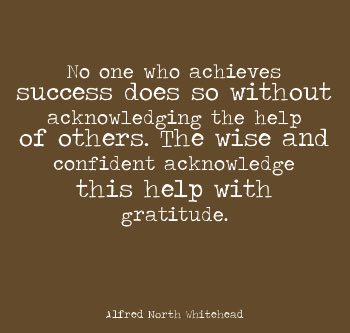 From all of us to all of you: Happy Thanksgiving, and thank YOU for reading our blog. If you find yourself with some extra time over the long holiday weekend, catch up with our B-Schooled podcast, which has new episodes every Wednesday covering just about every aspect of the MBA admissions process. You can find it on Apple Podcasts, Spotify, Stitcher, or TuneIn. Until next time, The team at Stacy Blackman Consulting The post Showing Gratitude This Thanksgiving appeared first on Stacy Blackman Consulting - MBA Admissions Consulting. |
| FROM Stacy Blackman Consulting Blog: B-Schooled Podcast Episode #83: Spotlight on Booth |
 The University of Chicago’s Booth School of Business prides itself on its Nobel Prize-winning faculty, a collaborative community, and the “Chicago Approach” to solving problems. This week, two former Booth adcom members (and current SBC admissions consultants) join B-Schooled to share their insights on what is unique about Booth, what the program’s adcom is looking for, and what student life is like both in and outside of the classroom. You can listen to episode #83 here, or on any of the podcast apps listed below. B-Schooled is available on most major podcast apps, including: Apple Podcasts Spotify Stitcher TuneIn Please be sure to subscribe to B-Schooled so that you don’t miss a thing. Also, if there’s something you’d like for us to cover in a future episode, please email podcast@stacyblackman.com. We’d love to hear from you! The post B-Schooled Podcast Episode #83: Spotlight on Booth appeared first on Stacy Blackman Consulting - MBA Admissions Consulting. |
| FROM Stacy Blackman Consulting Blog: How to Write a Great Career Goals Essay |
 Almost every MBA application has a career goals essay, yet many candidates struggle with this question. They know they want an MBA. But they haven’t defined their goals or how earning an MBA degree will help. Remember, a goal is something you want to achieve. Thus, “I want to work in management consulting” is not a goal. How then do you go about defining your career goals? Self-awareness about your strengths and interests will help you refine what you want. Your past experiences have likely informed your post-MBA plans. Share details in your essays about why you are interested in your specific career path. Don’t rehash your resume, though. Think about explaining the rationale for your decisions throughout the essay. Focus only on the situations that helped you realize what you really want to do. Or helped you to build skills that have become important to your goals. Something Negative Can Positively Impact Your Career Goals Essay Sometimes, reflecting on low points in your career makes it easier to see which job functions you either loved or hated. Talk to colleagues and alumni who have MBAs in your field to understand your career path options better. We tell people to tap into envy when they’re thinking of their career goals. You’re probably thinking about people doing things that you’d like to do. Ask yourself, “Who is this person? What about them would I like to emulate?” That can help you define your goals in many ways. Also, an essay showing a career path tied to your passions and interests will pique the admissions team’s curiosity. Choose realistic yet aspirational career goals. Your post-MBA goal should be achievable and show the need for the degree. Come up with a clear, cohesive vision of your career goals, and tie it all together with your background and accomplishments. This is a great first step in a successful application strategy. The post How to Write a Great Career Goals Essay appeared first on Stacy Blackman Consulting - MBA Admissions Consulting. |
| FROM Stacy Blackman Consulting Blog: Face Off: Wharton School Vs Chicago Booth |
 The school selection process for MBA applicants can seem overwhelming. With so many great business schools, how do you decide which one is right for you? SBC’s blog series Face Off teases out the strengths and differences between two similarly ranked b-schools. Plus, we’ll highlight noteworthy elements of their admissions processes. The first item of business today: the Wharton MBA application versus the Chicago Booth MBA application. We have former Admissions Officers from Booth and Wharton on our team. Thanks to them for the thoughtful advice below. How do the admissions requirements and selectivity compare between the Wharton School and Chicago Booth? From an application perspective, Booth gives candidates more freedom to be themselves. It also has a more holistic approach. Meanwhile, the Wharton MBA application reflects a more structured approach. Overall, the Wharton School is more selective than Chicago Booth. Almost every applicant accepted into both chooses Wharton, according to our data here at Stacy Blackman Consulting. Given Wharton’s higher yield, Booth takes a very personal approach to its application process. It wants to make sure candidates genuinely want to attend Booth and don’t treat it as a backup school. “Show up, engage, make yourself known. Showing up means a lot to Booth. They track the frequency in their system. This is true for all applicants, but especially over-subscribed candidates,” shares a former Booth Admissions Officer on the SBC team.  Admission trends at Booth last season showed more flexibility with admit profiles. This reflects a more diverse class by industry, academic records, and employer history. The program tends to attract more collaborative students. After all, collaboration is a cornerstone of Chicago Booth’s pay-it-forward culture. (Listen to B-Schooled Podcast Episode #83: Spotlight on Booth) Meanwhile, the Wharton MBA tends to attract more competitive types, and the MBA experience will reflect this intensity. Still, the team-based discussion component of the Wharton MBA application exists for a reason. That is, to weed out folks who can’t play well with others.  The Wharton group interview offers a preview of the energy prospective students will step into on campus from day one. (Listen to B-Schooled Podcast Episode #42: Wharton Team-Based Discussion Interviews) How do the MBA curriculums compare, given that both are known to be quant-oriented? We often hear from applicants in forum discussions that they apply to Booth mainly because of its flexible curriculum and student culture. A study on GMAT Club drew the following conclusions: Curriculum, faculty, brand, and robust student culture are Booth’s significant strengths. Wharton, meanwhile, primarily relies on its brand, alumni network, and career opportunities. About 82% of students say Booth’s curriculum and professors are its core strengths. Compare this to the 64% of students who say brand Booth and student culture are its major strengths. There is a perception that they are “finance schools.” How do the MBA Class of 2021 career outcomes between the schools stack up? Industry placement lead is comparable per the data points below:
Both programs consistently rank in the top 7. They offer a comparable education. Principles in accounting, finance, and marketing are basically the same at both Wharton and Booth. The difference between the programs is perception. The Wharton brand holds more cache globally. As a result, Wharton attracts a stronger student class. It also has higher yield rates, applicant volume, and average starting salary. “A few years ago, the elite candidates were only applying to HBS and GSB. Wharton has found its way to the trifecta,” explains Stacy Blackman. Booth isn’t yet at this level by perception. But, fit is everything. Integral to fit is student culture and post-MBA career location preferences, which vary between the programs. Both schools have high-caliber cohorts. Wharton tends to attract a more competitive applicant pool, so the MBA experience will reflect this intensity. The upside of this relative admit flexibility (compared to Wharton) by Booth is that the program attracts a more collaborative student class. “Wharton is a *hyper*-social environment. From day one, there is constant activity and a never-ending social calendar. Extroverts will love it. Introverts with strong social skills will find a balance that works for them. But introverts without social graces would find it stifling,” shares a former Wharton Admissions Officer who now works at Stacy Blackman Consulting. To conclude, the key differences between the programs may be:
The post Face Off: Wharton School Vs Chicago Booth appeared first on Stacy Blackman Consulting - MBA Admissions Consulting. |
| FROM Stacy Blackman Consulting Blog: B-Schooled Podcast Episode #84: Spotlight on Fuqua |
 If you want to be on Team Fuqua, this week’s episode is for you! It’s jam-packed with insider information from Sherry, part of our SBC admissions consulting team who was formerly an Assistant Director of Admissions at Duke’s Fuqua School of Business admissions committee. Sherry gives advice for each of Fuqua’s essays, in addition to sharing valuable insight on several aspects of Fuqua’s curriculum, campus life, and what students like to do in the surrounding Durham, North Carolina, area. Listen to B-Schooled episode #84 here, or on any of the podcast apps listed below. B-Schooled is available on most major podcast apps, including: Apple Podcasts Spotify Stitcher TuneIn Please be sure to subscribe to B-Schooled so that you don’t miss a thing. Also, if there’s something you’d like for us to cover in a future episode, please email podcast@stacyblackman.com. We’d love to hear from you! The post B-Schooled Podcast Episode #84: Spotlight on Fuqua appeared first on Stacy Blackman Consulting - MBA Admissions Consulting. |
| FROM Stacy Blackman Consulting Blog: Which MBA Funding Source is Right for You? |
 Getting your MBA acceptance letter is a once-in-a-lifetime experience. But submitting your deposit for business school is a thrill of a different kind. After you decide where to attend, you’ll only have a few months to get your finances in order. It’s never too early to assess which MBA funding source makes the most sense. Scholarships and fellowships: It’s worth noting that scholarships for MBA students have increased recently. As we shared last season with Find MBA, the number of scholarships awarded to our clients has risen by 10 percent annually over the past three years. Our recent client pool received $4.8 million in scholarship dollars. About 20-25% of SBC clients receive scholarships ranging from $10,000 to full-ride offers valued at $200,000. Also, we have had countless clients who received merit scholarships from 2+ schools upon admit notification. Your application quality on its own can invoke a windfall of scholarship dollars. Diligence and strategic planning in developing your MBA application pays off, as we mentioned in Find MBA. Keep in mind, fierce competition for these scholarship dollars means you’ll benefit from having the time to build a strong pitch for why you deserve a coveted spot in the program. The key is to know your niche relative to the cohort in which you’re competing. Then, identity and showcase ways you are unusual within your industry’s applicant pool. The savviest students receive multiple offers and can leverage them to negotiate a larger offer.  Female MBA applicants should check out this recent BusinessBecause article listing the top MBA scholarships for women. “To promote a more diverse business school cohort, many schools and independent organizations offer MBA scholarships for women only,” Matt Kefford writes. “These range from a few thousand dollars to help with tuition costs, to full payment of your fees.” Also, remember that you may have to submit a different application or essay for each fellowship or scholarship. Look beyond your business school, too, to organizations such as the Forte Foundation or Consortium for Graduate Study in Management. Both offer valuable scholarships for MBA students. Company sponsorship: If you’re one of the lucky few with a sponsorship offer, make sure you know what you’re getting into before you accept this MBA funding source. Sponsorship often comes with an obligation to return to the company after you complete your degree. Thus, you’ll want to take a step back and assess whether you’re confident you wish to return. Breaking such an agreement after you earn the degree can lead to strained relationships with former colleagues. It can also leave you with a mountain of unforeseen debt.  If you plan to return to your company but don’t have sponsorship, it never hurts to ask about options. See if you’re eligible for any reimbursement given the new skills you’ll bring to the table. Retirement savings: This less obvious MBA funding source comes with a few extra considerations. First, you should always think hard before touching funds set aside for retirement. But those who have saved aggressively already and plan to continue doing so may find it worthwhile to take some money out for the short term. You’re exempt from the 10 percent penalty for early withdrawals when you put the funds toward qualified higher education expenses, of which attending business school is one. You’ll still face income tax on this money. But the tax burden will likely be less when you’re in a graduate student tax bracket. Federal loans: The U.S. government offers at least two loan options for each academic year: the Stafford Loan and the Grad PLUS Loan. To tap into this MBA funding source, you can apply for these loans online via the Free Application for Federal Student Aid. Also, the Department of Education is an excellent resource for information on rates, fees, eligibility, and more. This summer, Nerd Wallet published a roundup of their favorite federal and private MBA student loan options for 2021. Check out their recommendations as a jumping-off point. Private loans: When you’re looking for the right loan, it pays to shop around. Find a lender you trust at an interest rate you like. Private loans can provide customized options to help you save, sometimes at rates even lower than the federal government’s. If you’re looking to augment your other MBA financing, seek a lender with excellent customer service and ask about what loan options can maximize your savings. Finally, use an online MBA student loan calculator to organize your costs and see how loans with different interest rates can work in your favor. Your MBA is a significant investment. Make the best use of the months ahead to make sure you have all the funding you need. We’ve updated this previously published post with new scholarship and loan information for 2021. The post Which MBA Funding Source is Right for You? appeared first on Stacy Blackman Consulting - MBA Admissions Consulting. |
| FROM Stacy Blackman Consulting Blog: Round 2 at HBS is Almost Here |
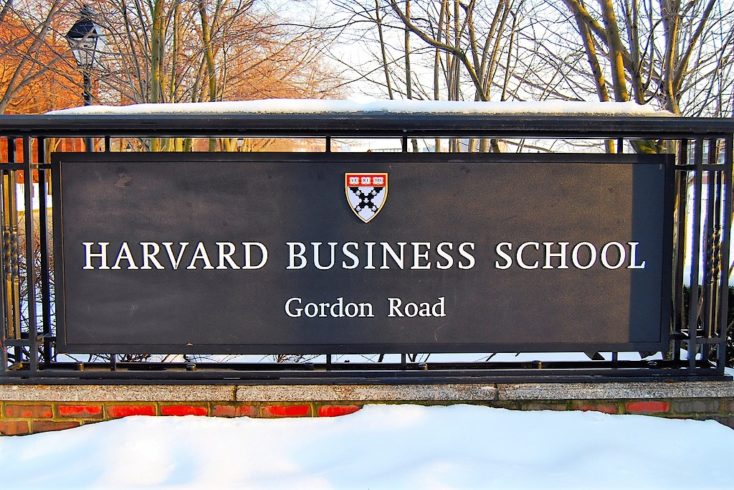 Is your MBA application for Round 2 at HBS as strong as it can be? The deadline is coming up on January 4, 2022. That means there’s no time like the present to review some key elements your Harvard Business School application should highlight. Unsurprisingly, high-impact leadership is the “Big Kahuna” at HBS. Meaning, it’s the essential trait that the admissions committee wants to see. When evaluating your leadership potential, the AdCom will look for evidence that you’ve made a positive impact on the communities of which you’ve been a part, both personally and professionally. Are You a Leader? Your past leadership achievements are the best gauge of your potential for realizing your future ambitions, so make sure to highlight instances that support your case in this area. The admissions committee understands you may not have several years of work experience from which to draw. Take comfort in knowing that it’s not about the scale of your achievements. Instead, it’s the fact that you left indelible footprints. How Have You Made the World a Better Place? Be sure also to focus on service to others in your application. As with leadership, the committee is concerned with the connection between your achievements and how they reflect who you are. Community service is vital for two reasons. First, because it provides insights into your deeper interests and the causes that you care about. Secondly, the admissions officers want to see evidence that you’re the type of person who devotes energy to making a community stronger. After all, they may be inviting you into their community.  With a mission to “educate leaders to make a difference in the world,” HBS isn’t looking for candidates who want a résumé boost. If you’re applying to Harvard, you have to have passion and vision—think big. Passion is a useful tool for staying motivated and productive, whether it’s in school or business. But it goes much deeper than simply being passionate about what you’re doing. You need to express your passion in a way that inspires and projects energy onto those with whom you work. It’s not just your footprints that interest HBS admissions. They also want to see the footprints of those who follow you as you blaze a new trail in an area of passion. Before You Submit in Round 2 at HBS Prospective applicants can take advantage of one of these upcoming webinars to learn more about HBS before this season’s final deadline.
*** If you need further proof that pursuing a Harvard MBA is the right path for you, check out this evergreen post from the HBS MBA Voices Blog. See here for NEW 2021 HBS interview advice, including format, evaluation criteria and sample questions. The SBC team wishes you much luck with your HBS application and interview and would love to support your efforts. Contact one of our SBC Principals to request availability for HBS interview preparation by emailing hbs@stacyblackman.com asap. As a reminder, HBS interview prep support at SBC is available only after interview invites have been extended. Here’s the overview of SBC’s interview prep services. Do you need a second set of eyes to review your application before Round 2 at HBS? Work with a Stacy Blackman consultant on an hourly basis. The post Round 2 at HBS is Almost Here appeared first on Stacy Blackman Consulting - MBA Admissions Consulting. |
| FROM Stacy Blackman Consulting Blog: Is finance a good career path and why? |
|
[list] [*]How do finance career paths and MBA admissions overlap?[/*] [*]What’s the appeal of the finance career path?[/*] [*]Pros and cons of investment banking[/*] [*]What are the finance industry employers?[/*] [*]Investment banker salary + bonus[/*] [*]Post – MBA Associate position at an investment bank[/*] [*]Private equity compensation[/*] [*]Is investment banking a good career goal for my MBA essay?[/*] [*]Sample MBA application essay excerpts[/*] [/list] [b]How do finance career paths and MBA admissions overlap?[/b] Our insights about MBA admissions for finance industry candidates was through a [url=https://www.efinancialcareers.com/news/2018/07/leverage-banking-resume-get-mba-harvard-wharton-stanford]client study [/url]we did several years ago about success factors for getting admitted to Harvard, Stanford and Wharton for private equity applicants. In this analysis, we are looking to guide young professionals who are currently not in either investment banking (IB) or private equity (PE) roles but who seek to attain that IB-PE career path through and after their MBA program. We wrote about the merits of the investment banking career path in a [url=https://www.stacyblackman.com/investment-banking-mba-career-path/]conversation with SBC consultant[/url], Puja, whose professional trajectory followed a similar route. Puja shared, “I began to work towards an investment banking career after earning my MBA from Wharton. The idea of working on large corporate deals was intellectually exciting to me. Plus, the prospect of applying my strong quantitative foundation, along with the ability to interface directly with clients, was extremely appealing.” Career switching through the MBA experience is common but it entails a lot of time and diligence. We often see clients whose pre-MBA career paths entail softer skills primarily and so they look to the MBA degree to acquire hard, quantitative analyses and frameworks for a comparably data-driven career path ahead. We have seen many non-traditional applicants, including those from education and marketing, covet the finance industry career path because of its prestige and financial upside. [url=https://www.stacyblackman.com/contact/]Request a free MBA candidacy analysis[/url] to understand your career profile for MBA admissions [b]What’s the appeal of the finance career path?[/b] A Wall Street career path conjures up images of advising the super wealthy through billion-dollar transactions. It’s not surprising that many ambitious professionals find that path alluring. Selling financial savvy and market predictions can give these young professionals the feeling that they are superheroes and can bring huge paydays. [url=https://www.investopedia.com/terms/i/ipo.asp]IPOs[/url], mergers, acquisitions, corporate lending, institutional trading, and other big-ticket Wall Street transactions are all among the appealing-but-demanding work responsibilities of a finance professional. Investment banking is the foundation of Wall Street riches. Bloggers [url=https://www.investopedia.com/articles/financial-careers/09/big-career-on-wall-street.asp]online[/url] have said, “Wall Street is still the greatest bastion of individual [url=https://www.investopedia.com/terms/c/capitalism.asp]capitalism[/url] in the world and a place where determined individuals can work their way from answering the phones to calling the shots in just a matter of years. But the reward doesn’t come easy, free, or fairly.” It requires incredible diligence, preparation and work ethic. [img]https://www.stacyblackman.com/wp-content/uploads/Screen-Shot-2021-12-06-at-3.15.14-PM.png[/img] [b]Pros and cons of investment banking[/b] When we canvassed sources about the pros and cons of the finance, here was what we heard: Pros [list] Rubbing elbows with the rich and famous[/*] Six figures compensation right out of school[/*] Investment banking pays more than consulting[/*] Gain an incredible financial skillset[/*] Build a great network[/*] Incredible exit opportunities into other attractive career tracks[/*] [/list] Cons [list] Long hours: 70 to 100 hour weeks [/*] Pay is traditionally heavily weighted toward the bonus and that’s volatile[/*] Positions usually go unadvertised and require hustle; must fight tooth-and-nail for a shot[/*] Filled with high-performance people who are used to getting their way[/*] Quality of life[/*] [/list] [b]What are the finance industry employers?[/b] Bulge Bracket Investment Banks: JP Morgan, Goldman Sachs, and Morgan Stanley; Bank of America Merrill Lynch and Citi; Credit Suisse and Barclays; Deutsche Bank and UBS. Middle Market and Other Full-Service Banks: Wells Fargo, RBC, Jefferies, Houlihan Lokey, Harris Williams and many European, Asian, and Canadian banks, such as HSBC, BNP Paribas, Mizuho, Nomura, BMO, and CITIC Elite Boutique Investment Banks: Centerview, Evercore, Greenhill, Guggenheim, Lazard, Moelis, Perella Weinberg, PJT Partners (formerly Blackstone), Qatalyst, and Rothschild (only in Europe) [b]Investment banker salary* + bonus:[/b] [list] Analyst – First Year: $70,000 – $150,000[/*] Analyst – Third Year: $120,000 – $350,000[/*] Associate – First Year: $150,000 – $350,000[/*] Associate – Third Year: $250,000 – $500,000[/*] Vice President: $350,000 – $1,500,000[/*] Managing Director/Partner: $500,000 – $20,000,000+[/*] [/list] Typically an IB analyst bonus is between 30-100% of base. *Source: https://www.wallstreetoasis.com/salary/investment-banking-compensation [b]Post – MBA Associate position at an investment bank[/b] Varies according to signing bonus, relocation bonus etc. [list] Base salary: $125,000-$150,000[/*] Bonus: $80,000-$200,000[/*] Total: $200,000-$500,000 based on tenure and seniority[/*] [/list] [img]https://www.stacyblackman.com/wp-content/uploads/Screen-Shot-2021-12-06-at-3.07.30-PM.png[/img] [b]Private equity* compensation[/b] [list] Analyst/Associate – First Year: $100K – $250K[/*] Analyst/Associate – Second Year: $150K – $300K[/*] Analyst/Associate – Third Year +: $170K – $350K[/*] Vice President: $300K – $800K[/*] Managing Director/Partner: $500K – $10MM+[/*] [/list] *Source: https://www.wallstreetoasis.com/salary/private-equity-compensation [b]Is investment banking a good career goal for my MBA essay?[/b] We asked the [url=https://www.stacyblackman.com/about/mba-admissions-consulting-team/]former MBA Admissions Officers[/url] on our team to chime in. A former Wharton Admissions Officer on our team shared, “Attainable career goals, as stated in the MBA application, are important to the top MBA programs, especially since several, such as Wharton, have combined Admissions and Career Services under the same umbrella. MBA Admissions Officers are thinking about exit opportunities when reviewing the application in terms of: [list] is this person already on the fast track,[/*] are their goals achievable and reasonable, [/*] do they have a plan for how they will use their time during the program[/*] how will they meet their goals?[/*] [/list] Whether investment banking makes sense for your career path essay depends on many factors. What you end up pursuing when you’re actually at your MBA program is entirely up to you but getting in is the first priority, right? Let’s look at sample career goals next. [b]Sample MBA application essay excerpts[/b] Example #1: After receiving an MBA from Columbia, I first intend on transitioning from strategy consulting into investment banking, where I will gain financial modeling skills and have the opportunity to identify and evaluate prospective targets. In this role, I would combine my previous acquisition implementation experience from consulting with M&A finance principles from my MBA coursework to achieve a well-rounded understanding of the entire transaction life cycle. My role in investment banking will then serve as a critical stepping stone for me to move into private equity after 3-5 years. This transition will allow me to integrate both financial and operational deal knowledge to make sophisticated investment decisions and enhance stakeholder values. An MBA at Columbia at this time would be pivotal in helping me navigate my career transition from strategy consulting to investment banking. Example #2: Post-MBA, I plan to pursue an investor relations role focused on Latin American clients at a private equity firm. Leveraging my background of working directly with Latin American institutional investors in custodial banking services, I will pivot into a front office role of acquiring and servicing new clients for this investment class at a firm such as XXX or ZZZ. With the increasing popularity of private equity investments, I believe I could be a real asset to a private equity firm due to my fluency in Spanish, my cultural background, and my experience with local regulation in Latin America. These skills combined with a Goizueta MBA will enable me to capitalize on the opportunity to help PE firms grow and expand into the growing Latin American markets. However, I recognize that I need the technical finance skills that a Goizueta MBA could offer me in order to be successful at a PE firm. Additionally, I believe Goizueta would help me enhance my worldview through the global focus and the immersion opportunities to engage in projects globally. Example #3 An MBA from Wharton will enable me to make the transition from management consulting to private equity. As a consultant, I have sized markets, analyzed SWOTs, and developed quantitative and qualitative research techniques. As early as 2007 I was leading projects on my own including a study to develop market penetration strategies and scenarios in the regional jet market for Spirit Aerosystems, a multibillion dollar aircraft structures manufacturer. Based on my recommendations, Spirit has expanded into a standalone aero-structures supplier, breaking out of its captive supplier position by broadening its customer base. My five years as a consultant coupled with my military training and leadership have provided me with a solid foundation from which to begin my MBA. A Wharton MBA will allow me to integrate the lessons I have learned in both pursuits and provide me with the managerial knowledge, cross-functional business acumen, and formal leadership training required of a successful private equity professional. Example #4 In the short term, I will use my MBA to transition to a private equity investment role at a multinational investment firm like Carlyle, Blackstone or KKR. By capitalizing on Wharton’s advanced elective finance classes, I hope to sharpen my analytical proficiency and deepen my investment strategy knowledge. Ultimately, I hope to leverage the leadership skills I develop at Wharton to land an executive position in the private equity division of a global investment firm. I intend to use my platform to campaign for the promotion of women to leadership positions across the industry. Through courses such as William Lauder’s Decision-Making in the Leadership Chair, I will have direct exposure to C-suite professionals and learn how to both position myself for a similar role and overcome challenges once in the position. For more information on career opportunities, see our [url=https://www.stacyblackman.com/mba-careers-by-program-facts-figures/]Career Recruiting by MBA Program[/url] overview. [url=https://www.stacyblackman.com/contact/]Request a free MBA candidacy analysis[/url] to understand your career profile for MBA admissions The post [url=https://www.stacyblackman.com/is-finance-a-good-career-path-mba-applications/]Is finance a good career path and why?[/url] appeared first on [url=https://www.stacyblackman.com]Stacy Blackman Consulting - MBA Admissions Consulting[/url]. |
| FROM Stacy Blackman Consulting Blog: Showing Leadership in Your B-School Application |
 At Stacy Blackman Consulting, we do a lot of thinking about leadership—what is it, how best to showcase it, why it matters, and more. Conveying leadership in your b-school application should be one of your top three most important goals. While some schools emphasize it more than others, leadership is essential to every school. After all, their job is to groom leaders, not just number-crunchers, marketers, or statisticians. Many applicants freak out when faced with any iteration of the leadership question on their MBA essays. They imagine they have got to come up with an example of their most extraordinary life or professional achievement. But just because you achieved something outstanding does not always mean it involved leadership skills. Leadership also often gets confused with management. Yet being a great leader is not just about managing something, although that can be a part of it. Leadership is about leaving a footprint on whatever situation you’re in and doing more than a good job. Remember, leadership is never a solo effort. One of the central tenets of leadership essays is showing that you can galvanize other people’s actions. You bring out their passions, educate them, and help them see organizational priorities in new ways. And then they share in the achievement. You’re inspiring others and bringing out the best in them. These two points are critical and help to explain how leadership differs from just any achievement. The most impacting leadership essays will have heroes other than yourself. If you helped Henry in accounts receivable realize his full potential on a project you led, showcase him as a hero in your leadership tale. In the best of all worlds, people create a good balance between these types of essays at the beginning of their application process, even before they start writing.  Tips on How to Highlight Leadership in Your B-School Application In many instances, you can still adjust your application late in the process to achieve the appropriate balance between individual achievement and leadership. Adding in a few sentences here and there about enabling others, or educating and defining priorities for group endeavors, will go a long way toward rounding out your profile. What kind of experiences will make the best tales of leadership? Think about challenges where the following came into play:
Collecting impressive titles does not make someone a great leader—helping a team overcome significant challenges does. Don’t worry about coming up with wildly impressive situations, even if you’re applying to the most elite MBA program in the world. You can solve more minor problems and still show leadership potential. For instance, we advised one younger candidate who was applying to business school with just six months of work experience under her belt. Consequently, she had few obvious leadership examples to share. But, she had taken it upon herself to overhaul an Excel spreadsheet for the investment bank where she worked. To do this, she had to state the problem, come up with a solution, and sell others, including supervisors, on her idea. Her improved spreadsheet—containing market information including Treasury rates—saved time, became a tremendous internal resource, and helped the bank communicate better with clients. Taking the initiative to change this spreadsheet was what she wrote about in her application.  Look for “Outside the Box” Leadership Examples If you don’t have obvious career-related stories, you can also mine your extracurricular activities for examples that convey leadership in your b-school application. Writing about how you started a club, organization, or charitable group will work, too. If you have been involved in an activity as a member, think about taking on a leadership role. This is your opportunity to demonstrate that you can run a project and motivate a team. For example, one of our former clients launched an English club in his native China. He needed to improve his language skills for business school and thought his neighbors might benefit, too. The club grew, and he made his mark in the community, which was something he could point out to admissions committees. He showed he could inspire and motivate others, organize a group, and learn a new language to boot. This applicant ultimately was accepted at Harvard Business School. When it comes to evaluating your application, members of the MBA admissions committee believe your past leadership achievements are the best gauge of your potential for realizing your future ambitions. You can’t go wrong if you use your essays to show how you’ve worked to inspire others and bring out the best in them. The post Showing Leadership in Your B-School Application appeared first on Stacy Blackman Consulting - MBA Admissions Consulting. |
| FROM Stacy Blackman Consulting Blog: B-Schooled Podcast Episode #85: Spotlight on Rice Jones |
 As B-Schooled continues its series of program-spotlight episodes, next up is the Jones Graduate School of Business at Rice University. This week, host Erika talks with Lisa, an SBC admissions consultant who was formerly the Director of Admissions at Rice Jones. Lisa shares a lot of wonderful insight on the Rice community; what Jones is looking for in applicants’ essays and interviews; and nearly convinces Erika to move to Houston after running through everything the city and its surrounding areas can offer its students and residents! Listen to B-Schooled episode #85 here, or on any of the podcast apps listed below. B-Schooled is available on most major podcast apps, including: Apple Podcasts Spotify Stitcher TuneIn Please be sure to subscribe to B-Schooled so that you don’t miss a thing. Also, if there’s something you’d like for us to cover in a future episode, please email podcast@stacyblackman.com. We’d love to hear from you! The post B-Schooled Podcast Episode #85: Spotlight on Rice Jones appeared first on Stacy Blackman Consulting - MBA Admissions Consulting. |
| FROM Stacy Blackman Consulting Blog: Year-End To-Do List for MBA Applicants |
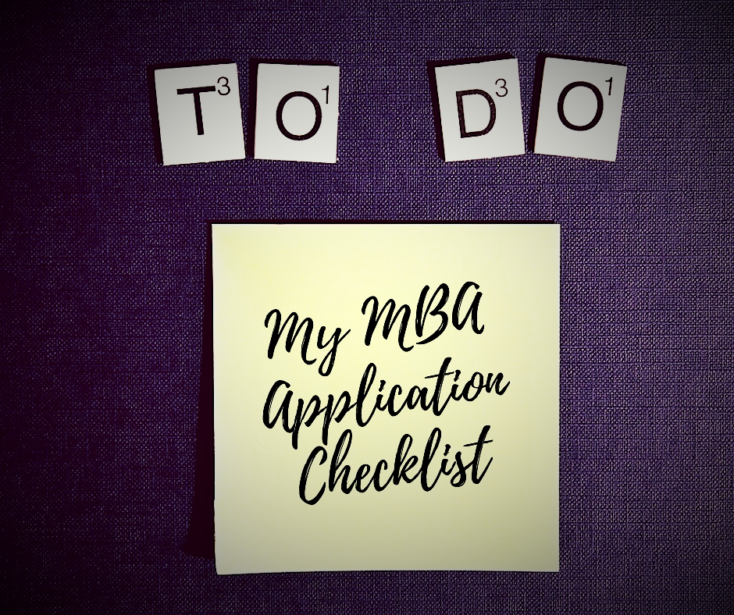 It’s early December—the home stretch for MBA hopefuls applying to business school in uber-competitive Round 2. With numerous deadlines hitting in early January, you’ll need to manage your time well throughout the holidays. Run through this To-Do List for MBA applicants and make sure you have every application component covered. Right now, prepping recommenders and drafting essays make up the two most important focus areas. Here’s what you need to do to stay on track and avoid becoming overwhelmed. #1 On the To-Do List for MBA Applicants: Recommender Management Great recommendation letters are one of the most critical pieces of your MBA application. They give the admissions team much-needed third-party insight to round out your essays and resume. By now your recommenders should know your hard deadlines. (See B-Schooled podcast episode #78: Unique Recommender Situations) Current and recent supervisors make the best choices because they can speak to your present-day skills, values, and work ethic, as well as future potential. If you haven’t already, it’s time to remind them of the attributes you want them to highlight in their letter. Spell out precisely what you hope they will convey in their recommendation. MBA programs want to see examples of leadership, teamwork, and management potential. Additionally, you can make things easy for your recommender by providing a list of at least three strengths with supporting anecdotes. Remind your supervisor of your career goals as a reference. Your recommenders want to boost your admissions chances and will welcome the guidance. Encourage each of them to submit early if possible, so you can focus on the part of the application you need to deliver—the essays. #2 MBA Application Essays  Ideally, applicants should allow six weeks for this portion of the application. Many candidates find it helpful to start by writing rough drafts that go 50% or more above the required word count. While that seems like more work, it ultimately creates a better final product. The revision process helps you hone in on the best topics or anecdotes to support your overall application. Applicants from over-represented industries such as finance, information technology, engineering, or consulting should use the essays to focus on the aspects of your personal life that make you unique. Include hobbies, community service activities, passions and interests that make you stand out. Check out this evergreen essay tips post from admissions director Soojin Kwon at Michigan Ross School for inspiration. If you need extra insight about what the admissions committee is looking for at your target schools, consider using one of SBC’s strategy guides. These resources analyze the qualities that each school seeks and help applicants understand which stories to emphasize throughout their materials. Competition is always fierce in Round 2, but additional factors will affect this season’s applicant pool in particular. First, more international students are applying to US schools after sitting out last year due to embassy closures and visa hurdles. Also, the record application numbers of the 2020-21 cycle led to more dings. Many of those applicants will reapply now. Third, this is likely the final admissions cycle allowing test waivers for many MBA programs. Candidates who feel unsure about their standardized test performance may decide to throw their hat in the ring this year to test the waters on their candidacy strength. Good luck to everyone working on the Round 2 application countdown! The post Year-End To-Do List for MBA Applicants appeared first on Stacy Blackman Consulting - MBA Admissions Consulting. |

|
|